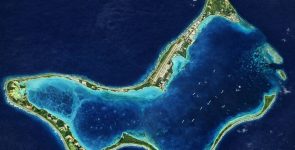
A second Trump administration could bring considerable challenges for climate diplomacy, climate finance, and Small Island Developing States (SIDS) like the Maldives, which are among the most vulnerable nations to climate change. With his previous administration’s withdrawal from the Paris Agreement, favouring domestic energy independence over global climate commitments, and scepticism towards multilateral climate frameworks, a renewed Trump presidency may signal a retreat from the international stage. This could have far-reaching implications for global climate action and specifically for countries like the Maldives, whose very existence is threatened by rising sea levels.
Eroding International Climate Leadership
In his first term, President Trump prioritised domestic policy and economic nationalism over global environmental cooperation, leading to the U.S.’s exit from the Paris Agreement and a withdrawal of federal support for climate initiatives. Although the Biden administration reversed these decisions, re-joining the Paris Agreement and restoring funding to international climate funds, Trump’s return would likely mean another pivot away from climate leadership. For SIDS, this shift could stall crucial climate negotiations, reduce funding for adaptation and resilience projects, and undermine collaborative efforts. With fewer powerful allies advocating for ambitious climate policies, SIDS may find it harder to gain attention on the world stage and secure the resources needed for adaptation.
The U.S. plays an important role in the UN’s Green Climate Fund (GCF) and other climate finance mechanisms essential to SIDS. While the U.S. may swiftly withdraw from the Paris Agreement, Trump’s administration would still be bound to other significant climate frameworks, including the UN Framework Convention on Climate Change (UNFCCC) – the foundational treaty established in 1992 for global action against climate change. Some of Trump’s closest advisors, however, advocate for a more extreme exit, calling for a full withdrawal from the UN’s climate efforts, including the UNFCCC itself. Such a move would significantly weaken multilateral efforts to combat climate change, especially for Small Island Developing States (SIDS) like the Maldives, which rely on international climate finance to address rising sea levels and build climate-resilient infrastructure. The loss of U.S. participation in these mechanisms, such as the Green Climate Fund, would create a funding gap.
Reduced Global Climate Finance
The international community has long recognised the need to financially support SIDS in addressing climate impacts that they contribute little to creating. Under a second Trump administration, the U.S. is likely to reduce funding to multilateral organisations, limiting the resources available for climate adaptation in these nations. Historically, the Trump administration has preferred bilateral agreements and resisted the growing calls for global climate finance initiatives, which could affect funding pipelines for SIDS.
For the Maldives, this would mean facing the challenge of obtaining adequate finance independently or relying on alternative sources, potentially from more climate-progressive regions like the European Union or private sector partnerships. However, such shifts could increase financial and bureaucratic barriers, delaying essential projects and development goals. In practical terms, climate finance is crucial for sustaining fishing, tourism, and agriculture sectors in the Maldives, which are all threatened by changing weather patterns and sea-level rise. Reduced access to these funds would hamper national efforts to transition to renewable energy and implement coastal protection measures, potentially jeopardising long-term development.
Multilateralism and the Role of SAARC
With the potential likelihood of waning U.S. engagement in climate diplomacy, regional alliances such as the underutilised South Asian Association for Regional Cooperation (SAARC) could become increasingly relevant for SIDS like the Maldives. SAARC, which includes major South Asian nations such as India, Pakistan, and Sri Lanka, holds untapped potential as a collaborative platform for addressing climate issues, particularly in regions exposed to similar environmental risks. Although SAARC has historically struggled to maintain consistent collaboration due to regional tensions, a renewed emphasis on climate goals might offer a chance to bridge divides and create unified strategies for adaptation and resilience.
SAARC could provide a more regional-focused platform for climate action, reducing the dependence on Western-led climate finance mechanisms and instead fostering South-South cooperation. By strengthening SAARC’s climate agenda, South Asian nations could prioritise regional challenges, such as managing shared coastlines, developing sustainable tourism, and investing in renewable energy projects suited to tropical climates. As a member of SAARC, the Maldives could lead efforts to bring climate action to the forefront of the organisation’s agenda, advocating for collective adaptation strategies that address specific regional vulnerabilities.
The Urgency for Collective Regional Action
In the absence of strong U.S. leadership, the Maldives may need to advocate for SAARC’s role in climate diplomacy, encouraging member states to take collective action that can provide both financial and technical support to SIDS. With access to shared resources, regional expertise, and focused strategies, SAARC can bridge gaps left by diminished international climate finance. By working together on projects like ocean conservation, disaster response frameworks, and renewable energy development, SAARC members can ensure a more resilient future for all.
As the Maldives navigates potential shifts in U.S. climate policy, embracing SAARC as a tool for regional resilience may prove instrumental. Establishing SAARC as a committed partner in climate adaptation could help counterbalance the potential loss of international support, creating a more reliable foundation for long-term resilience.











